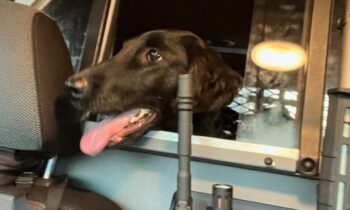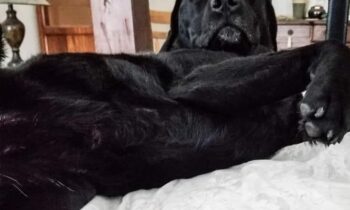
Penny is a standard dachshund. She’s six years old. Penny has had no experience staying even overnight away from home. Her human family knows Penny is okay with other dogs, but they aren’t sure how she’ll behave away from a familiar setting without them.
They are, however, hoping Penny might stay with me during a trip they’ve planned out of the country next summer. To prepare for that, Penny recently came to my house to meet my dogs. That short visit—about fifteen minutes—went very well.
My dogs, both the five-pounder and the fifty-five pounder, thought Penny was okay. They’re used to company, my dogs, so having a total canine stranger dropping by to say hello is nothing new to them. They probably complete much the same checklist as I do, with Are we safe around this animal? at the top in bold letters.
Penny’s checklist, I’d guess, was about the same. In every situation, dogs must know Am I safe or am I not? and act accordingly. My dogs were pretty sure they’d be safe with Penny, but Penny was not sure she was completely safe and comfortable with them. And she was wise to feel that way, I’d say (to anthropomorphize a bit more).
Penny had no experience to know how safe she might be in a new situation. She was friendly and outgoing with me, initiating physical contact and clearly indicating I could pet her. She certainly didn’t shy away from either of my dogs, although she was far more decisive about approaching and investigating my smaller dog, which makes sense—less threatening in size and manner. To Penny, the bigger dog was . . . big. I don’t blame her. He is big and she is short, if not small. Plus, of course, these are unknown dogs and an unknown human in a whole new environment—an unknown home that also houses a cat and two ferrets. (Imagine the smells alone!)
Penny’s human drives her to somewhere she’s never been, walks her up the steps to a strange house, hands her leash to an unknown human . . . and then leaves! Penny certainly had reason to be concerned.
But even though Penny was not completely relaxed during her first time here, that’s very normal behavior for a dog with no visiting experience. Afterward, I suggested to her human that we plan another short visit—maybe about an hour—for sometime after the holidays, then take it from there. We have lots of time to accustom the dogs to each other before next summer. I was looking forward to it.

Not long after that, Penny’s human contacted me. His aunt and uncle in Florida are elderly and he’d decided he wanted to see them again while he could. He and his wife could make the trip from Washington during the holidays . . . if I could offer Penny a place to stay.
I was glad he felt that Penny’s reaction to our first meeting had been okay. I said yes.
We have company every year for the holiday season—our animal extended family, three dogs and a cat. Two of the dogs are seniors and, at this point in their lives, somewhat frail. They have been a part of our lives since the youngest, now eight, was a puppy. We’ve had serious concerns about one of elders for the last few months, as she’s had some big health challenges and now requires special care. The other elder dog is just, well, old. The cat is a senior himself and grumpy.
I considered what would be required for the care of the health-challenged dog and her frail older sister. I didn’t see that having another well-behaved dog here would interfere. My younger dog would hang out with the youngest visiting dog; they are quite compatible and have similar interests and energy levels. I didn’t know where Penny would fit in with the other canines, but one way or another, we could make it work.
Penny has one annoying behavior. It’s not destructive, thank goodness—I mean, she could be chewing up expensive leather shoes or stealing your holiday dinner off the buffet, right? Instead, this particular behavior is grating because it’s seemingly ever-present and inescapable. It apparently comes with Penny. Her humans don’t like it, but it’s part of the dog they love.
Penny is a whiner.
I don’t know how much she whines at home or even under what circumstances. I do know her humans were very open about it. I also knew that during her first visit, she had whined nonstop from the minute she walked in except when she was outside in the yard. After she’d been here an hour on this second visit, I knew she wasn’t likely to stop within the next few minutes. In fact, I expected a sleepless night.
I wanted to try to figure out why Penny whined, but that was going to take some time. I needed a strategy for responding right now to the whining.
I knew what not to do: I would not punish or chastise her for whining. She is communicating. I don’t know exactly what she’s talking about, but that’s my failing, not hers. She is doing the best she can.
Is she whining because she’s stressed? Yes, I think so. That’s why it makes no sense to stress her more with punishment.
What do I want her to do instead?
I want her to be quiet instead of whining.
What should I be rewarding then?
I should be rewarding her silence.
I went about my normal business in the house and listened carefully. It’s an old dog trainer’s saying that eventually the dog has got to take a breath. That’s true!
The dog takes a breath and I say, “Good, Penny. Good quiet dog.” I say it calmly, happily, not in a high or squeaky voice, but just loudly enough that she can hear. I’m not praising to excite her; I’m praising to “mark” the moment she’s doing the behavior I want: not whining. I’m out of her sight during most of the praising so, in fact, I have no idea what else she’s doing—she could be standing on her head—but if she’s being silent, I’m praising.
I use few words. I say the praise and stop.
I stop instantly if she starts whining again.
I don’t worry too much if I miss a few moments of silence. That’s probably no big deal at this point. I make sure we both take lots of breaks. Her breaks are outside with the other dogs and my breaks are coincidental with hers. She arrived late in the day, having already been fed at home, so we take major breaks while the other dogs eat their dinners. (She does not whine while they eat!)
Penny chooses to stay downstairs in the front hall rather than join me, my two dogs, and one guest dog upstairs after dinner. I can easily hear her and, I think, she can easily hear me. I continue to praise when she’s quiet, and I note that the silences between whines are getting more and more frequent. I’m amazed. I can’t believe it could work that fast. I’m still expecting a sleepless night.
I have planned for her to sleep upstairs in the bedroom because that’s where she sleeps at home. I hope she’ll be more comfortable near the only available human. I will crate her because it’s her first night and I want all of us to have the best possible shot at a good sleep . . . which nobody will get if Penny is wandering around the house, awakening the other animals and upsetting everybody.
The dogs all have their final outing of the night and are put to bed in their respective places with some special holiday dog biscuits that we received as a gift. Penny goes to the front hall and doesn’t follow us upstairs, although I try to encourage her.
I hear footsteps in the hallway a few minutes later and she is at my bedroom door. I escort her to the crate I set up, filled with her own blankets from home. She trots into it with something like a sigh, as if to say, “Yeah, they told me I’d be crated.”
Penny has not whined since the dogs came in from outside.
I still fully expect to spend a sleepless night.
Next week: Will I spend a sleepless night? Will my plan to praise the silence work?



